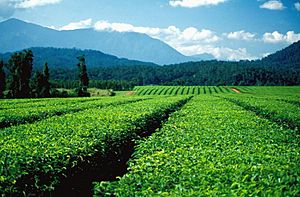Nerada Tea facts for kids
| Founded | 1882 |
|---|---|
| Founder | Cutten Brothers |
| Headquarters |
Nerada, Queensland
,
|
| Products | tea and coffee |
Nerada Tea is an Australian company that makes tea and coffee. It is the biggest tea producer in Australia.
Contents
History of Nerada Tea
Early Beginnings: The Cutten Brothers
In 1886, four brothers named James, Leonard, Sidney, and Herbert Cutten chose a piece of land. It was on the coast north of Mission Beach in Bingil Bay. They called their new farm Bicton.
The brothers worked hard to clear the thick forest. They turned it into land where they could grow crops. They also got help from the local Aboriginal people.
The Cuttens planted both tea and coffee. But they found it hard to get workers to pick tea all the time. Tea needs to be picked very often. They had much more success with their coffee. They even built their own coffee mill. They sold their coffee under the name Bicton Coffee.
The Cutten brothers did well. They made their home bigger and added a sawmill. They also built a wooden railway line. This line went from the sawmill to a large stone wall. This wall was their wharf and protected their boats.
Facing Challenges and Disasters
The brothers faced many problems. A big storm called a cyclone hit in 1890. This caused serious damage. There was also a drought and fires in 1902. Many coffee trees were destroyed. Herbert Cutten was badly burned.
James Cutten later sold his share to his brothers. He moved to Cairns and worked as a draftsman. The brothers also lost most of their workers. This happened when the Queensland Government moved Aboriginal people to settlements. This limited how many could be employed. Another cyclone hit in 1911.
The start of World War I was tough for the Cutten brothers. Most ships they used to send their products were needed for the war. The biggest problem came with the huge cyclone of 1918. Two cyclones hit Queensland that year. The second one in March was very powerful.
The town of Innisfail was almost completely destroyed. In Bingil Bay, a massive tidal surge came with the winds. It washed away their big stone wharf. Almost their entire farm was ruined. The brothers, who were in their sixties, rebuilt their home. But they never replanted their orchards or coffee farms.
A New Start: Dr. Maruff's Discovery
The jungle grew back over the farm. Then, in the 1950s, something special was found. Dr. Allan Maruff rediscovered a part of the Cutten brothers' farm. Dr. Maruff was a doctor from India. He had settled in Innisfail.
After many years as a doctor, he wanted to grow tea. His wife's family lived in Darjeeling, a famous tea area in India. She noticed that the land around Innisfail looked similar.
In the 1950s, Dr. Maruff searched for the Cutten brothers' old farm. He found it in the rainforest. There, he saw the old tea plants that had grown wild. The original tea plants had become very large trees. Smaller tea plants and seedlings grew from their seeds. Dr. Maruff collected hundreds of these seeds and seedlings. He planted them in a nursery behind his office.
Building a Tea Empire
In 1958, Dr. Maruff started the first commercial tea farm in Australia since 1886. This was in the Nerada valley, south of Cairns, Queensland. This farm became the very successful Nerada Tea. The old tea plants from the Cutten brothers' farm helped start a new tea industry. It grew not only in Queensland but also in Papua New Guinea. Dr. Maruff even sent seeds from Nerada to new farms there.
In 1969, a company called Tea Estates of Australia (TEA) started planting tea next to the Nerada farm. In 1971, Nerada Tea Estates (NTE) opened Australia's first factory just for tea. In 1973, TEA bought NTE. They stopped selling tea in bulk and started selling it under the Nerada brand. The next year, TEA opened a small packing factory in Innisfail.
In 1991, TEA opened a bigger tea factory in Glen Allyn, near Malanda. They opened a larger packing plant in Brisbane the next year.
By 2019, the Nerada Tea farm and factory were located at 933 Glen Allyn Road. Nerada Tea was the biggest supplier of Australian-grown tea. They had over 400 acres of tea plants in the Cairns Region. They produced about 1,500,000 kg of black tea.
Recent Changes
In May 2023, Nerada stopped all work at the farm. This happened because fewer people in Australia were drinking tea. Many people had started drinking more coffee instead. The tea farm was put into "hibernation." The tea rooms, which used to attract many visitors, were closed.
See also
- Tea in Australia
- List of oldest companies in Australia
- List of tea companies
 | Dorothy Vaughan |
 | Charles Henry Turner |
 | Hildrus Poindexter |
 | Henry Cecil McBay |


